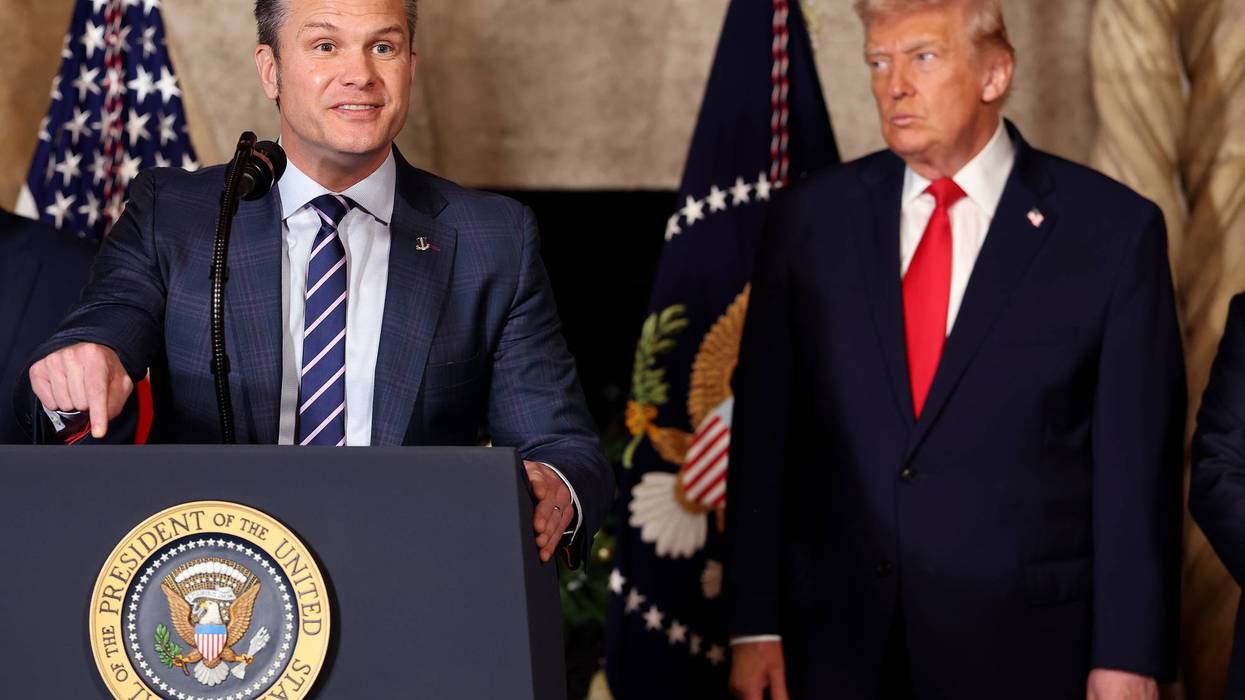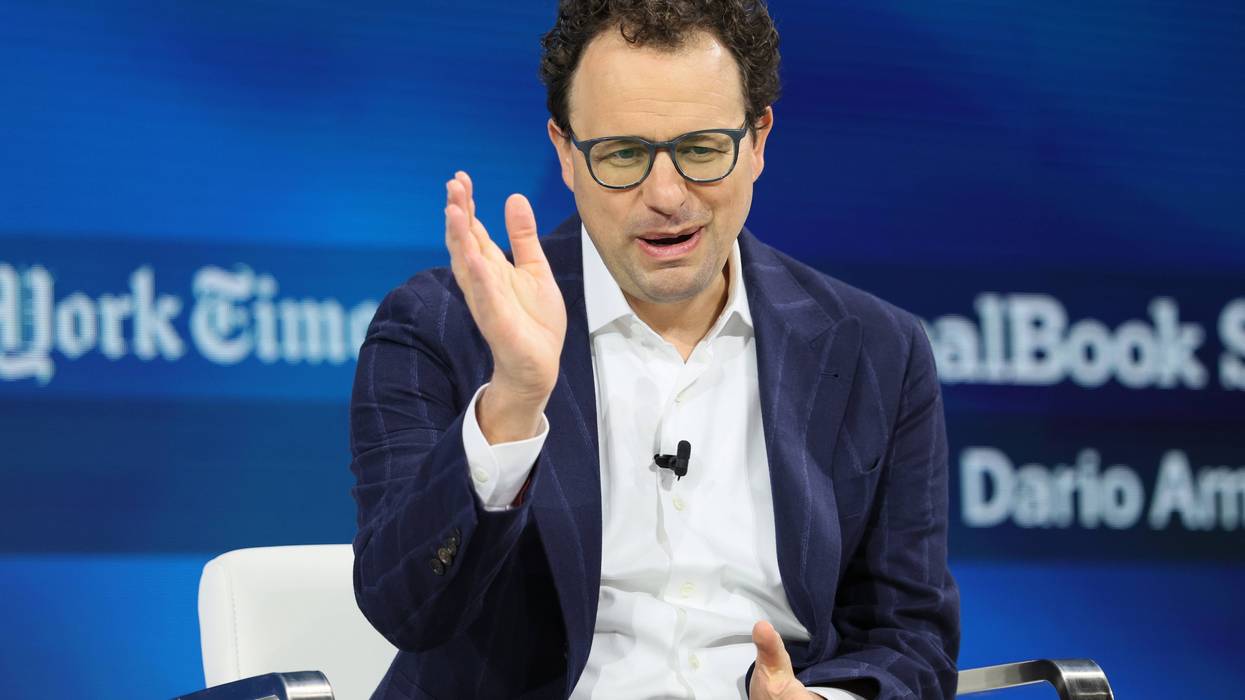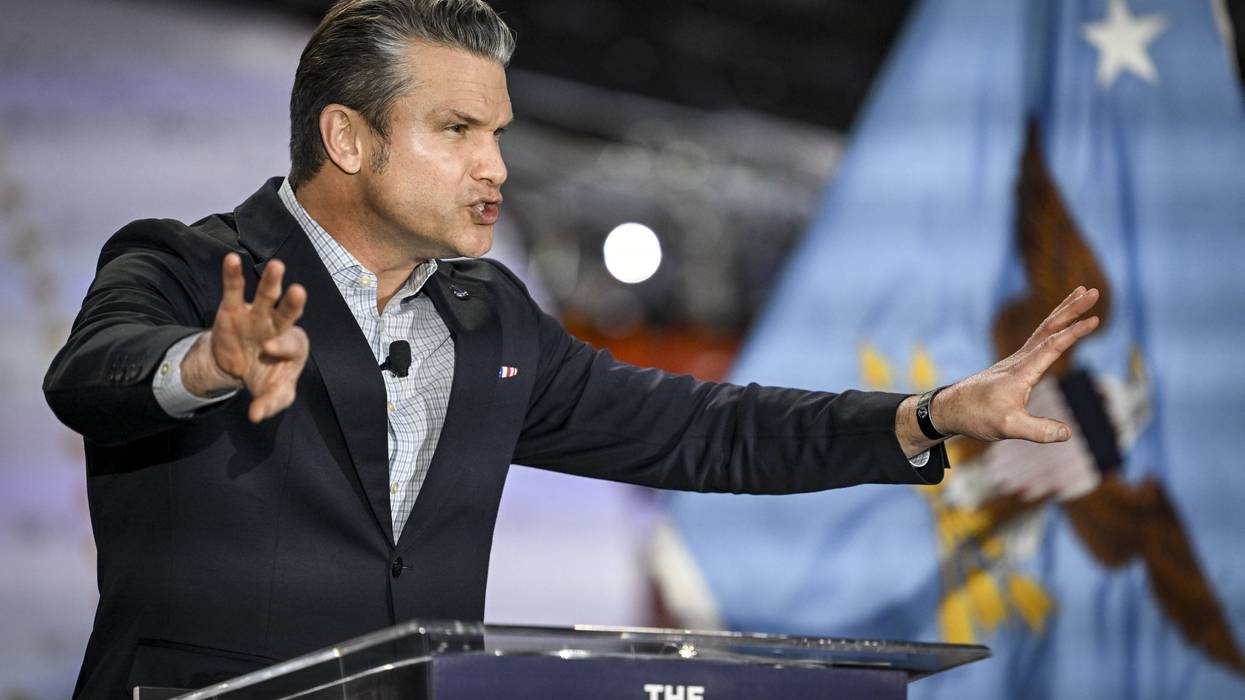Trump Cuts Off Anthropic, AI Firm That Stood Against Killer Robots and Mass Surveillance
"Demanding security guardrails for how AI is used by the Department of Defense isn't radical—it's protecting the constitutional rights of the American people," said New Jersey's Democratic governor.
US President Donald Trump "is throwing this tantrum and calling Anthropic 'radical left' because they refuse to have their AI be used for illegal mass surveillance and murder. That's literally it."
That's how progressive commentator Kyle Kulinski described Trump's Friday social media post "directing EVERY Federal Agency in the United States Government to IMMEDIATELY CEASE all use" of the artificial intelligence firm's technology—including its chatbot Claude.
As Kulinski's podcast co-host and wife Krystal Ball summarized, "According to the president, objecting to autonomous killer robots and mass surveillance is 'radical left.'"
Earlier this week, Defense Secretary Pete Hegseth gave Anthropic until 5:01 pm Eastern time Friday to agree to let the Pentagon use the company's AI tech however it wants. He threatened to declare Anthropic a "supply chain risk," effectively blacklisting it for military use and ending its current contract, or invoke the Defense Production Act, which would force the company to tailor the product to the Department of Defense's (DOD) needs.
After the DOD reportedly sent Anthropic its "best and final" offer Wednesday night, the company's CEO, Dario Amodei, published a blog post explaining that "we cannot in good conscience accede to their request," and reiterated opposition to enabling autonomous weapons or surveillance of US citizens.
While Anthropic employees, other tech experts, and critics of the current administration praised Amodei for "standing on principle" and choosing "war with the Department of War"—the president's preferred name for the Pentagon—Trump predictably lashed out at the company on his Truth Social platform.
"THE UNITED STATES OF AMERICA WILL NEVER ALLOW A RADICAL LEFT, WOKE COMPANY TO DICTATE HOW OUR GREAT MILITARY FIGHTS AND WINS WARS! That decision belongs to YOUR COMMANDER-IN-CHIEF, and the tremendous leaders I appoint to run our Military," Trump wrote Friday afternoon.
"The Leftwing nut jobs at Anthropic have made a DISASTROUS MISTAKE trying to STRONG-ARM the Department of War, and force them to obey their Terms of Service instead of our Constitution," he continued. "Their selfishness is putting AMERICAN LIVES at risk, our Troops in danger, and our National Security in JEOPARDY."
Directing agencies to stop using Anthropic's tech, Trump added:
We don't need it, we don't want it, and will not do business with them again! There will be a Six Month phase out period for Agencies like the Department of War who are using Anthropic's products, at various levels. Anthropic better get their act together, and be helpful during this phase out period, or I will use the Full Power of the Presidency to make them comply, with major civil and criminal consequences to follow.
WE will decide the fate of our Country—NOT some out-of-control, Radical Left AI company run by people who have no idea what the real World is all about. Thank you for your attention to this matter. MAKE AMERICA GREAT AGAIN!
Amodei had notably written in his blog post that "our strong preference is to continue to serve the department and our warfighters—with our two requested safeguards in place. Should the department choose to offboard Anthropic, we will work to enable a smooth transition to another provider, avoiding any disruption to ongoing military planning, operations, or other critical missions."
While Trump's order preceded Hegseth's initial deadline, the defense secretary publicly weighed in at 5:14 pm, writing on Elon Musk's social media network X that "this week, Anthropic delivered a master class in arrogance and betrayal as well as a textbook case of how not to do business with the United States government or the Pentagon."
Hegseth described the company's terms of service as "defective altruism," and reiterated the Pentagon's position that "the Department of War must have full, unrestricted access to Anthropic's models for every LAWFUL purpose in defense of the republic."
The Pentagon chief also officially directed the DOD to designate the company a supply chain risk to national security, meaning that "effective immediately, no contractor, supplier, or partner that does business with the United States military may conduct any commercial activity with Anthropic."
"Anthropic will continue to provide the Department of War its services for a period of no more than six months to allow for a seamless transition to a better and more patriotic service," Hegseth added. "America's warfighters will never be held hostage by the ideological whims of Big Tech. This decision is final."
The New York Times noted that "the Pentagon is ready to move forward with Grok, produced by Elon Musk's xAI, on its classified system. But Grok is considered by current and former government officials to be an inferior product. And switching AI software would take time and almost certainly cause disruption."
While Anthropic hasn't publicly responded to Trump or Hegseth, critics, including congressional Democrats, have continued to praise the company and blast the administration for how they've each handled the conflict this week.
"Anthropic objected in part to the Department of Defense using its AI technology to engage in domestic mass surveillance. Do you agree that's a radical left, woke position?" asked Congressman Ted Lieu (D-Calif.). "That's actually the constitutional position, one that should be embraced by Americans regardless of party."
Replying to Trump's post specifically, Democratic New Jersey Gov. Mikie Sherrill similarly said: "Yet another alarming attack by the president on a private company defending its principles. Standing up against mass surveillance and demanding security guardrails for how AI is used by the Department of Defense isn't radical—it's protecting the constitutional rights of the American people."
Describing himself as "one of Congress' most vocal proponents for the modernization" of DOD and US intelligence community (IC) missions with transformative technology, Senate Select Committee on Intelligence Vice Chair Mark R. Warner (D-Va.) said in a statement that "the president's directive to halt the use of a leading American AI company across the federal government, combined with inflammatory rhetoric attacking that company, raises serious concerns about whether national security decisions are being driven by careful analysis or political considerations."
"President Trump and Secretary Hegseth's efforts to intimidate and disparage a leading American company—potentially as the pretext to steer contracts to a preferred vendor whose model a number of federal agencies have already identified as a reliability, safety, and security threat—pose an enormous risk to US defense readiness and the willingness of the US private sector and academia to work with the IC and DOD, consistent with their own values and legal ethics," he continued.
"Indeed," he added, "Secretary Hegseth's loud insistence on the sufficiency of an 'all lawful purposes' standard provides cold comfort against the backdrop of Pentagon leadership that has routinely sidelined career military attorneys and challenged longstanding norms and rules regarding lethal force."


